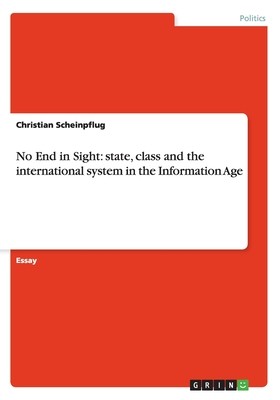
- We will send in 10–14 business days.
- Author: Christian Scheinpflug
- Publisher: GRIN Verlag
- Year: 2012
- Pages: 20
- ISBN-10: 3656261660
- ISBN-13: 9783656261667
- Format: 17.8 x 25.4 x 0.1 cm, softcover
- Language: English
- SAVE -10% with code: EXTRA
Reviews
Description
Essay from the year 2012 in the subject Politics - International Politics - Region: Other States, grade: 1,7, The Open University, language: English, abstract: The often abstract sounding term called 'the international' could be made better sense of if it is to be conceived of as a system. As such, it functions because socially organized entities (currently nation-states) are affected by mutual social interaction on political, socio-cultural, economic and technological levels. This kind of interaction among those entities, or more precisely, the seeds of current social order, can be traced back to pre-modern times, when agriculture facilitated settlement and communities formed as a consequence (Bromley and Brown, 2004, p. 3). A key event in specific communal organisation is the rise of the sovereign nation-state, an outcome - most are convinced - of the Peace Treaty of Westphalia in 1648. This development was so successful that the sovereign social organisation of communities is still the most common form, and up to this day determines relations at all levels within the international system (Bromley and Brown, 2004, p. 3). While the nation-state can claim authority to regulate domestic political life and social interaction, it lacks a comparable authority in the international realm. Any interactions - be they social, political or economic - among nation-states are therefore taking place in an anarchic, as opposed to a hierarchic, environment. In order to be able to analyse interaction among states, or simply put, international politics, a framework can be modeled that is informed by observations and abstractions, which are derived from actual and perished societies, represented as the "problematic of the international" (Bromley and Brown, 2004, p. 3). The problematic of the international also includes the studying of interaction of various socially organized entities (not merely nation-states) - so-called geopolitics - and so reveals agents, transforming characters
EXTRA 10 % discount with code: EXTRA
The promotion ends in 14d.16:54:53
The discount code is valid when purchasing from 10 €. Discounts do not stack.
- Author: Christian Scheinpflug
- Publisher: GRIN Verlag
- Year: 2012
- Pages: 20
- ISBN-10: 3656261660
- ISBN-13: 9783656261667
- Format: 17.8 x 25.4 x 0.1 cm, softcover
- Language: English English
Essay from the year 2012 in the subject Politics - International Politics - Region: Other States, grade: 1,7, The Open University, language: English, abstract: The often abstract sounding term called 'the international' could be made better sense of if it is to be conceived of as a system. As such, it functions because socially organized entities (currently nation-states) are affected by mutual social interaction on political, socio-cultural, economic and technological levels. This kind of interaction among those entities, or more precisely, the seeds of current social order, can be traced back to pre-modern times, when agriculture facilitated settlement and communities formed as a consequence (Bromley and Brown, 2004, p. 3). A key event in specific communal organisation is the rise of the sovereign nation-state, an outcome - most are convinced - of the Peace Treaty of Westphalia in 1648. This development was so successful that the sovereign social organisation of communities is still the most common form, and up to this day determines relations at all levels within the international system (Bromley and Brown, 2004, p. 3). While the nation-state can claim authority to regulate domestic political life and social interaction, it lacks a comparable authority in the international realm. Any interactions - be they social, political or economic - among nation-states are therefore taking place in an anarchic, as opposed to a hierarchic, environment. In order to be able to analyse interaction among states, or simply put, international politics, a framework can be modeled that is informed by observations and abstractions, which are derived from actual and perished societies, represented as the "problematic of the international" (Bromley and Brown, 2004, p. 3). The problematic of the international also includes the studying of interaction of various socially organized entities (not merely nation-states) - so-called geopolitics - and so reveals agents, transforming characters


Reviews